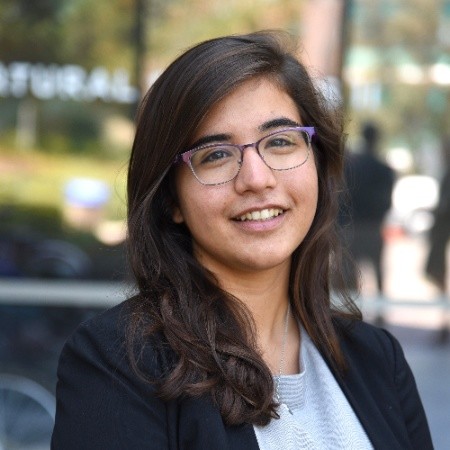Environmental Systems Ph.D. student Leila Wahab is one of 80 graduate students to receive the U.S. Department of Energy’s (DOE) highly competitive Office of Science Graduate Student Research (SCGSR) fellowship.
The goal of SCGSR is to prepare graduate students for science, technology, engineering, or mathematics (STEM) careers critically important to the DOE Office of Science mission, by providing graduate research opportunities through an extended residency at DOE national laboratories.
“Leila is an incredibly capable, resourceful, hard-working, dedicated and enthusiastic student. She has demonstrated that she has tremendous potential to independently develop novel and important research projects, work hard to achieve her goals in a timely manner, and communicate effectively,” her faculty advisor Professor Asmeret Asefaw Berhe said. “I am very proud that her work is being recognized by this award and that she will have an opportunity to pursue advanced spectroscopic and other research approaches in collaboration with Dr. Jennifer Pett-Ridge at Lawrence Livermore National Lab.”
Wahab studies the impact California’s shifting seasonality in precipitation will have on soil carbon and nitrogen pools. She is investigating the process and the result of changing precipitation patterns — both amount and seasonality — on California’s grasslands.
“Receiving this DOE award means the world; I am incredibly honored to receive it,” said the Houston native. “This award will allow me to pursue advanced spectroscopic methods that will take my research to the next level and allow me to go after questions more aligned with my interests about nitrogen compounds in particular.”
Wahab will intern at Lawrence Livermore National Lab from August 2022 to August 2023.
The DOE SCGSR program plays an important role in sustaining a pipeline for highly skilled scientific and technological workforce development.
“For decades, DOE has cultivated the expertise to meet the nation’s greatest scientific challenges. Now more than ever, we need to invest in a diverse, talented pipeline of scientists, engineers and entrepreneurs who will be the future science and innovation leaders of this country,” said Under Secretary of Science and Innovation Geraldine Richmond. “I’m thrilled these outstanding students will help us tackle critical research at our labs, and I know their futures are bright.”
As for her future goals, Wahab plans to continue her research at a university, national lab, or other government organization.
“More than anything, I want to keep studying soils and keep mentoring other students to prepare our society for the crucial environmental challenges of the coming century,” she said.




